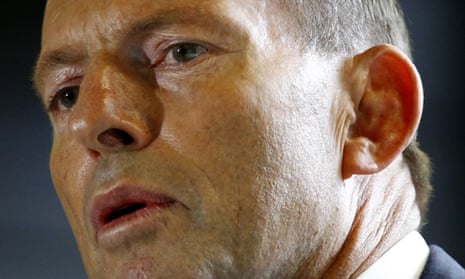To some Liberals, Tony Abbott’s treatment of Gillian Triggs exemplifies everything self-defeating and diminishing in his leadership style.
Like many voters, they think that attempting to hound a statutory office-holder from her position is yet more evidence of a dysfunctional, gladiatorial winner-takes-all leadership style where external and internal critics are ridiculed or ostracised and “debates” are won by shutting down alternative views.
They know that electors might not understand the rights and wrongs of the assertions of bias against Triggs, but they recognise unseemly bullying when they see it. They’d have been much better impressed had Abbott left the bullying to one side and concentrated on the rapidly reducing numbers of children in detention. As one Liberal minister put it, Abbott’s “crazed character-assassination” of Triggs was not only out of all proportion to the allegations of bias against her, but also made no sense as a political strategy. At least two backbench MPs made a similar point, using less inflammatory language during last week’s party room meeting.
So those Liberal MPs approved of leadership contender Malcolm Turnbull who said the debate about Gillian Triggs “misses the main point ... the main point is the children. Children in detention is something nobody wants”.
But in the conservative wing of the Liberal party that installed Tony Abbott and has only recently and reluctantly contemplated leadership change and maybe (shut their eyes, hold their nose) even a return to Turnbull, the Triggs comments diminished Turnbull’s support. They cost him votes. They were seen as evidence that, given power, Turnbull would once again “veer to the left”, that he was “out of step with the conservative side of the party on what is seen as a totemic issue”, that he was “out of touch with the party’s base”.
The wildly differing ways that the treatment of Gillian Triggs is viewed within the Liberal party explains a great deal about its current state of desperate leadership indecision.
Conservative Liberals are facing a conflict between their survival instinct and what a shift to Turnbull might mean for the terms and conditions of their ongoing political life. If Turnbull were to become leader, these same deep factional divisions would once again be his central weakness. It explains why he has not struck as Abbott flounders – he will ultimately succeed only if he maximises his internal authority.
Some are moving. Senior conservative figures shifted allegiance after the last disastrous week.
But as time passes Julie Bishop is also gaining confidence in presenting herself as an alternative candidate and a more palatable candidate to the conservative wing. She did nothing to anger the conservatives with her comments on Triggs. “She has a better ear for the base and she doesn’t bring Malcolm’s baggage,” was how one Liberal termed it.
These are the calculations seeping through the Liberal party as it enters the paranoid netherworld of late-stage leadership destabilisation. Every anonymously sourced story is pored over and parsed. Is it a sign that Turnbull is moving? Or is it an attempt to flush him out?
Backbenchers, who precipitated the last spill motion, say the ministry has to force a second one. Ministers are weighing their personal interests, the plummeting fortunes of the party and how the factional divisions can be bridged. No one can say how another spill would be triggered, or who might do it. Most MPs are nonetheless operating on the assumption that it will happen.
Abbott is making genuine, if belated, efforts to connect with the backbench. On Thursday evening he invited the entire backbench to drinks in the cabinet anteroom when they get back to Canberra on Sunday night. Some joked on Friday it may also be a tactic to have them all in a room where he could see them.
But at the same time his government is careening from one half-baked policy to another, as it desperately tries to “win” every day’s media cycle and improve the government’s standing in the polls in order to head off a challenge. Almost every policy is being bent out of shape as it passes through the politics of the leadership prism.
Last Monday the prime minister made a national security statement where the rhetoric about “rising dangers”, “ominous signs” and the “new dark age” ran well ahead of his actual policy proposals. His demand that Muslim leaders speak out more and “mean it” outraged the very community the government most needs onside to meet its national security goals.
On Tuesday he dismissed an intensely damaging leak from the Liberal’s treasurer about lack of financial accountability and transparency as a “storm in a teacup”, which is not the view of many members of the federal executive who will meet to discuss the ongoing and deep concerns next Friday.
On Wednesday Abbott spent a conservatively-estimated $3,300 flying to Sydney for 20 minutes to announce a consultation paper on new foreign real estate investment fees and rules to protect the “Australian dream” of homeownership, at a house that foreigners aren’t allowed to buy anyway. He and treasurer Hockey later said the fees were not intended to deter foreign investors, just to recoup the cost of screening them, which would seem to contradict the “protecting the Ozzie home-ownership dream” line. But the careening caravan of state had moved on by then.
And on Thursday Scott Morrison tried to talk about the quite sensible recommendations on welfare reform in the review by Patrick McClure, but debate was focused on the Australian federal police assessment of whether the job offer to Triggs constituted an inducement.
By Friday, Abbott was in the Queensland cyclone zone, en route to New Zealand, and MPs were back in their electorates once again assessing the self-inflicted political damage. Their resolve is firming that someone, somehow must do something about it. But they can’t say who, or when, or how it might fix the party’s underlying divisions and problems.

